
The eight episode of the UP Open University’s (UPOU) OPEN Talk was a delve on the topic of media literacy and fake news. Titled “Media Literacy: Iwasan maging biktima ng fake news,” the episode featured two experts who both lead communication offices in an education and a science institution.
Dr. Joane V. Serrano is the Director of the UPOU Office of Public Affairs and the Office of Gender Concerns. She is also an Associate Professor of the UPOU Faculty of Management and Development Studies (FMDS) and teaches courses on Science Communication and Environmental Advocacy. Director Marita A. Carlos is a Chief Science Research Specialist and the Division Director of the Applied Communication Division (ACD) of the Department of Science and Technology (DOST) Philippine Council for Agriculture, Aquatic, and Natural Resources Research and Development (PCAARRD). Ms. Margaret Jarmin-Suarez, UPOU University Researcher, moderated the discussion while Ms. Anna Cañas-Llamas, UPOU Information Officer, served as the host of the event.

(From upper left) Dr. Joane Serrano, Ms. Margaret Jarmin-Suarez, and Dir. Marita Carlos engaged in a lively discussion about media literacy and fake news in Open Talk’s Episode 8.
The episode was a lively question and answer session. Dr. Serrano defined fake news as a combination of misinformation, disinformation and mal-information. She explained that misinformation is information that is false, but not created with the intention of causing harm while disinformation is information that is false and deliberately created to cause harm, and mal-information is information that is based on reality, used to inflict harm on a person, organization or country. Director Carlos, on the other hand, explained that people who are usually victimized by fake news are those who are not aware of the truth. She advised everyone to be critical of information available on social media and online, check the source and date of release of the resource. Director Serrano added that fake news usually plays with the emotions of the readers so much that logic is overlooked. She also advised to practice triangulation which is to counter check the information with other resources.
To battle fake news, both experts shared the protocols on handling cases that involve their institutions. Dir. Carlos shared that PCAARRD has a Risk Communication Team who thoroughly studies the situation. She said that instead of battling fake news head-on, they release science-based and credible information. “Importante na mapalabas and tamang information na accurate at updated,” she said. Dr. Serrano then shared that at the UPOU, information goes through different levels of vetting before it is released. She added that UPOU has a Social Media Policy to ensure that its staff members are vigilant and critical when sharing information on social media platforms.
Director Carlos explained that being media literate means being able to evaluate and be critical of information encountered especially on social media, and making sure that this information does not manipulate the reader. Dr. Serrano gave three competencies needed to be media literate: (1) be able to access, retrieve and store information; (2) be able to evaluate by critical thinking and analysis; and (3) be able to create information from a variety of sources. She said that these competencies should be taught by teachers to students. Both resource persons also shared their take on both the bane and boon of technology in relation to media literacy.
Ms. Jarmin-Suarez read a few questions and comments from online viewers to which Dr. Serrano and Dir. Carlos willingly and aptly answered. One comment that Ms. Jarmin-Suarez mentioned was that “Technology will never replace good teachers, but technology in the hands of great teachers is transformational.”
The episode ended with the announcement of lucky viewers who evaluated the previous OPEN Talk episode and an invitation to watch the next episode which will be aired on 7 July 2021. It will be about remote learning challenges specifically for Alternative Learning Systems.
OPEN Talk is a one-hour public service program to be broadcasted real-time over the UPOU Networks website and UPOU Networks Facebook page. Episode 8 was jointly organized by the UPOU Multimedia Center and the Office of Public Affairs, and in collaboration with the Los Baños Science Community Foundation, Inc. (LBSCFI). To rewatch the episode and for more episodes of OPEN Talk, visit www.networks.upou.edu.ph.








